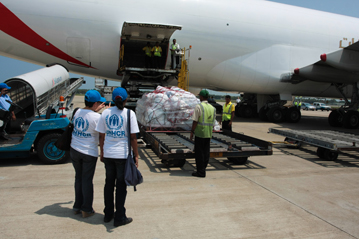Assistant High Commissioner tells Liberian refugees in Côte d'Ivoire to stay out of the conflict
Assistant High Commissioner tells Liberian refugees in Côte d'Ivoire to stay out of the conflict

ABIDJAN, Côte d'Ivoire, Dec. 16 (UNHCR) - A senior UNHCR official has warned refugees to resist attempts to involve them politically or militarily in the simmering conflict in Côte d'Ivoire.
On the second day of a six-day visit to the troubled West Africa region, Assistant High Commissioner Kamel Morjane met Saturday with a group of 170 refugees at a transit centre in Abidjan. He insisted that refugees should remain civilians and not take any part in the conflict which first erupted in mid-September.
"Refrain from any political or military involvement," Morjane told the group of homeless refugees from Liberia, Sierra Leone, Congo, Togo and Rwanda. "It is vital that refugees stay out of the conflict. You have benefited from the hospitality of this country and your involvement would make life very difficult for the other refugees living here."
Morjane's comments followed reports that some refugees had been recruited as fighters by warring parties in the west of Côte d'Ivoire. Fighting has been raging near the western border since November 28, when a new insurgency triggered heavy military activity in the area. The western region, which hosted some 45,000 mostly Liberian refugees before the conflict started, is now largely inaccessible to humanitarian agencies.
Although government forces have since been reported to have regained control over the border towns of Danané and Toulépleu, the situation in the area is still confused and volatile. UNHCR is concerned that refugees there will become targets for armed attacks and forced military recruitment.
Morjane also told refugees in Abidjan that despite the sensitive situation in Côte d'Ivoire, UNHCR would do its best to find safe solutions for them. Voluntary repatriation to Sierra Leone is being promoted for a small group of about 500 Sierra Leonean refugees in the country. Possible solutions for Liberians, who make up the vast majority of the 72,000 refugees in Côte d'Ivoire, include early return to Liberia and temporary evacuation to a safe third country in West Africa.
Meanwhile, an estimated 44,000 people have crossed into Liberia since the fighting spread to the west two weeks ago. The majority - some 29,000 - are Liberians returning home, while the remaining 15,000 are Ivorians seeking refuge in Liberia.
In another development, reports from southern Côte d'Ivoire said large population movements took place over the weekend around the coastal town of Tabou following rumours of impending attacks. Groups of people were seen heading towards the Liberian border at Prollo, 28 km west of Tabou.
UNHCR said it was concerned by reports that loyalist forces had attached explosives to the Prollo bridge, leading to the Cavaly River on the way to the Liberian border. This could pose a grave danger for refugees and others using the bridge. Last week, Ivorian troops detonated hand grenades wired to a UNHCR ferry in Prollo, saying they wanted to prevent rebels from crossing in and out of Liberia.
"One Liberian arrived in Abidjan from Tabou yesterday with his two children after fleeing because he feared for their safety," said Anne Dolan, the head of UNHCR's Tabou office who is currently in Abidjan. "He said he had to pay his way through checkpoints and was detained twice because he could not pay. He was released later, after Ivorians helped him pay for passage. The journey took him three days by bus - three times the usual travel time from Tabou to Abidjan."
Other refugees reaching Abidjan mentioned that some were heading towards Ghana by commercial bus.
After leaving Abidjan on Saturday, Morjane travelled to Liberia, where he met with government officials and visited the VOA camp for Sierra Leonean refugees near Monrovia.
"What I wish to see is that you all return home one day in safety and dignity," he told the assembled refugees. "Those refugees who can actually return home to a country in peace are fortunate."
UNHCR is promoting repatriation to Sierra Leone as a durable solution for refugees still in the West Africa region, particularly in Liberia which is itself torn by war.
Morjane praised Liberia for keeping its borders open to people fleeing Côte d'Ivoire.
The No. 3 UNHCR official spent Monday in Accra, Ghana, where UNHCR representatives from West African countries met to discuss the Ivorian crisis. He is scheduled to travel to Lomé, Togo, before returning to Geneva on Thursday.









